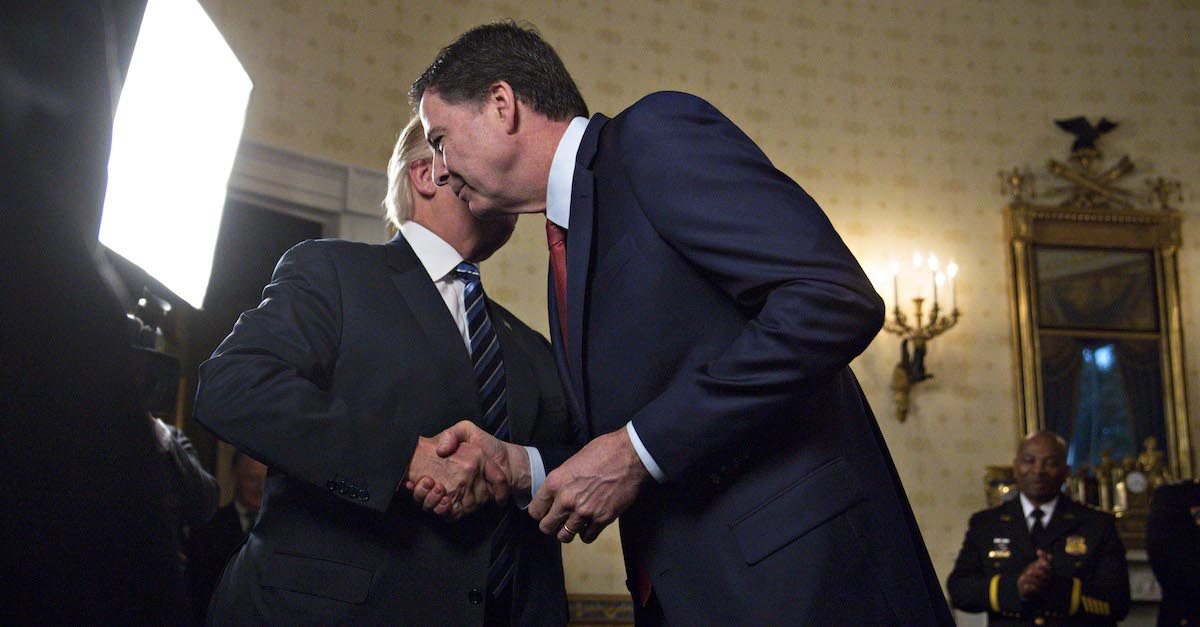
Fired FBI Director James Comey has some questions for former Special Counsel Robert Mueller ahead of next Wednesday’s long-anticipated testimony before Congress.
The point of Comey’s piece in Lawfare was pretty clear: “What I Would Ask Robert Mueller.” Comey didn’t limit the questions to Volume II of the report, which dealt only with the obstruction of justice prong of Mueller’s probe. Comey advised members of Congress to use their five minutes by sticking to Mueller’s executive summaries.
Examples of Comey’s questions on Volume I of the report, dealing with the investigation into Russian interference: “Did you find that senior members of the Trump campaign met with Russian representatives at Trump Tower after being told in an email that the meeting was part of the Russian and its government’s support for Mr. Trump?”; “Did you find that, despite the fact that candidate Trump said he had ‘nothing to do with Russia,’ his organization had been pursuing a major Moscow project into the middle of the election year and that candidate Trump was regularly updated on developments?”; “Did the Trump campaign report any of its Russian contacts to the FBI?”
In his only public comments about the Russia probe, Mueller said that his 448-page report on Russian interference in the 2016 election and the investigation into whether or not President Donald Trump obstructed justice was his testimony; he said he wouldn’t be telling Congress anything new. During his brief public statement, Mueller repeated the wording of his report.
“If we had confidence that the president did not commit a crime, we would have said so,” Mueller said. “Charging the President with a crime, therefore, was not an option we could consider.” Mueller also said it was his belief that it’s important for his office’s report to speak for itself.
It follows, then, that if Mueller is asked questions about matters in the report, he will answer them by sticking to the report. The main difference is that the American people will be able to see and hear Mueller respond, rather than interpreting the written word.
Regarding obstruction Comey wants to know, in part: “Did you reach a judgment as to whether the president had committed obstruction of justice crimes?”; “Did you find substantial evidence that the president had committed obstruction of justice crimes?”; “For example, did you find that the president directed the White House counsel to call the acting attorney general and tell him the special counsel must be removed?”
The last question is, of course, referring to the Mueller Report’s discussion of President Trump asking former White House counsel Don McGahn on two occasions to put into motion Mueller’s firing by calling up then-Deputy Attorney General Rod Rosenstein. Trump has accused McGahn of lying under oath about this to make himself look like a good lawyer. These were not the only questions Comey wants asked about Trump-McGahn: “Did you find that the White House counsel decided he would rather resign than carry out that order”; “Did you find that the president later directed the White House counsel to say he had not been ordered to have the special counsel removed?”; “Did you find that the president wanted the White House counsel to write a false memo saying he had not been ordered to have the special counsel removed?”; “Did you find that the White House counsel refused to do that because it was not true?”
Trump has claimed in the past the Comey and Mueller are “Best Friends,” but Comey has said that is not so.
“I think I had a meal once alone with him in a restaurant. I like him. I am not a — I’m an associate of his who admires him greatly. We’re not friends in any social sense,” Comey said.
The FBI previously said it could not find evidence that there were “100 pictures of [Mueller] and Comey hugging and kissing each other,” as Trump once said during an interview.
[Image via Andrew Harrer-Pool/Getty Images]